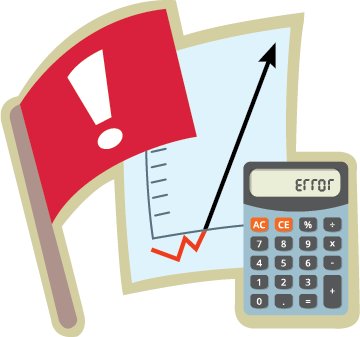Top 8 red flags that your small business might get audited
September 10, 2020 by Cheryl A.P. Patterson, EA, MSFS
When operating a business, the last thing you want to worry about is being audited by the IRS or a state agency. Record keeping should be as high of a priority as all other areas of daily operations. I find it helpful if you scan your support (bank statements, receipts, deposits) and keep those documents digitally (in the cloud or a separate portable hard drive) in the event the original source documents fade, get lost, or destroyed. It is possible to rebuild your history, however, this can be time intensive and overwhelming. Below are a few categories which may cause the IRS or a state agency to take a closer look at the operation of your business.
Low / High Gross Income Reported with Expenses that do not make sense
 The IRS or a state agency targets businesses that report losses or a low net income year after year. They look at your intent to make money (your business plan), whether or not you include personal expenses or correctly allocate purchases of equipment, security deposits, or other costs associated with your business that should not be expensed completely within one tax year, but over several tax years. There are many ways to support your income / expenses, including:
The IRS or a state agency targets businesses that report losses or a low net income year after year. They look at your intent to make money (your business plan), whether or not you include personal expenses or correctly allocate purchases of equipment, security deposits, or other costs associated with your business that should not be expensed completely within one tax year, but over several tax years. There are many ways to support your income / expenses, including:
- Report all gross income received (cash, checks, credit cards) – keep detailed lists through accounting software and photocopy or scan the items and staple a copy of the deposit slip so that the total deposit equals the attached support.
- If you receive payments electronically, such as through third-party processors (Paypal, Venmo), document how those deposits were transferred from those processors in your books.
- Only report expenses that are associated with the income generated. Do not mix your personal living expenses with your business expenses, such as paying your home electric bill from your business account.
Cost of Goods Sold or Supply Expense
Small business owners often make the mistake of expensing 100% of the material needed to manufacture a product or of an already manufactured product. It is important to make sure the raw material associated with manufacturing a product and products ready for resale are not expensed until they are sold. Utilizing accounting software is a good way to properly associate the cost(s) with the completed product when sold. If you are not manufacturing products but are reselling products you buy, do a physical inventory at the end of the year to determine the amount of products unsold. Many small businesses which should be tracking their inventory fail to do so.
Travel, Car/Truck, Meals Expense
 These areas are highly scrutinized by the IRS and state agencies as many business owners inadvertently mis-categorize or estimate their costs. Below are ways to support the costs reported:
These areas are highly scrutinized by the IRS and state agencies as many business owners inadvertently mis-categorize or estimate their costs. Below are ways to support the costs reported:
- Keep detailed diaries of each trip taken – including the date, the business purpose, and the name of the contact. Keep your receipts for all costs expended. It’s even a good idea to keep your boarding pass if you travel by plane or train.
- Keep a detailed mileage log that includes the date, the client’s name and detailed business purpose, and the mileage. Since you must prove that the miles were driven in addition to the business purpose, I recommend obtaining at least two odometer readings from a third party covering the year (oil change receipts, tire changes, any other service work completed). There are now many phone apps available to track your mileage which allow you to make notes regarding the business purpose for each trip.
- Keep a detailed diary of your meal expenses reflecting the date, the client’s name, and business purpose of the meal. To claim your own meal, typically you must be outside your city limits by at least 50 miles. It is always a good idea to keep the receipt noting the name of the client and the business purpose.
Type of Business
 For anyone starting a small business, the object should be to make money. A taxpayer may dip their toe into an industry while still working full time in hopes of being able to replace their wage paying job with the profits of their business, but it may take a while for the business to become successful. The IRS often targets businesses that sell beauty and health products, salons, and those that provide services such as construction, house cleaning, pool service, or landscape services. Below are suggestions to support your business activities:
For anyone starting a small business, the object should be to make money. A taxpayer may dip their toe into an industry while still working full time in hopes of being able to replace their wage paying job with the profits of their business, but it may take a while for the business to become successful. The IRS often targets businesses that sell beauty and health products, salons, and those that provide services such as construction, house cleaning, pool service, or landscape services. Below are suggestions to support your business activities:
- Have a written business plan that reflects when and how you plan to make a profit.
- Keep a detailed diary of business activities and time spent.
- It is vitally important to create a paper trail to not only support your expenses, but to prove income. I recommend keeping one dedicated checking account reflecting all income (deposits) and expenditures. It may be a good idea to accept payment(s) by check or credit card primarily. If you do accept cash, it is a good idea to have the customer sign the invoice for services rendered and paid. Make sure to deposit the cash payment into the checking account.
- Reconcile your bank account often to verify that all deposits and payments cleared your account, verifying that your support matches all cleared deposits and payments.
Home / Office Expense
Most small businesses are run from the home. Whether you keep track of the costs of running your entire home or use the home office “safe harbor” election, I recommend the following:
- Take pictures of the space(s) you designate for your business (office / storage), making sure not to include what may be considered personal use space.
- Take exact measurements of the space(s) designated.
- Report only the exact square footage utilized within your tax return(s).
Sales Tax Expense
For those businesses that must collect sales tax from their customers, you should verify that your gross sales (taxable and non-taxable) reported to the Board of Equalization or state revenue department match the reporting of gross sales on your tax return. For most taxpayers that report on a cash basis, that means your gross sales reported should match your bank deposits for the month, quarter, or year.
Outside Services/Sub-Contractor Expense
The IRS or a state agency will review this category for many reasons. The IRS may review this to determine if the small business expensed payments to an outside source (individual or another small business) of $600 or more and reported these payments on Forms 1099-MISC. The IRS or a state agency may review these costs to determine if the paid individual should have been paid as an employee instead of a contractor. They may also use this to generate additional audit leads. Make sure to pay for any services via check, not cash. It is vital that you support the expenditure by keeping a strong paper trail. Also critical, verify their tax ID number (if it is another business) or social security number (if it is an individual) and their contact information by having the vendor complete a Form W-9, Request for Taxpayer Identification Number and Certification, and, if necessary, keeping a copy of their social security card and driver’s license.
Estimating Costs / Income
Some of the most glaring red flags are when business owners report estimated (rounded) figures on their tax return(s). Reporting exact figures (that can be supported through bank or credit card statements) are extremely important. Do not estimate your expenses or income.
I just listed 8 reasons why the IRS may audit your small business, but there are many more. In a recent blog posted by one of my colleagues at TaxAudit, How often do small businesses get audited?, we learn that small businesses get audited 4.5 to 12 times more often than individuals. You don’t need to worry, though; TaxAudit offers Audit Defense for Small Businesses. When you purchase a membership before you get audited, TaxAudit will defend your business against any future notice or audit. TaxAudit deals with the IRS and state taxing authorities so you don't have to.





